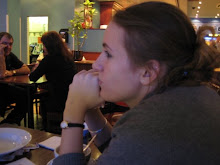In the Mapai van, provided by Jacob Luke (one of Todd's past students, now one of the richest men in PNG, and our constant benefactor). As we drove by, children would run down from the hills crying, "MAPAI!" and sometimes, "MAPAI . . . GIRLLLLLLLSSSSSSSSSSSSSSS!" We grew increadibly attached to the whole experience. This is a bit of our drive up to Ukarumpa (in the highlands) from Lae (on the coast). The landscape was beautiful.
There were several reasons Mapai was such a big deal (and such an answer to prayer). There is still fairly little travel done in PNG, as the roads are quite difficult. Jacob Luke runs one of the biggest transportation companies (transporting goods in huge trucks -- getting highland produce to the coast to be shipped). This can be troubling business, as PNG roads are not always safe, and owning a national company, Jacob can't get the insurance his foreign competitors can. Therefore, his insurance is having each truck "adopt" a town along its route, and basically provide for those families. Villagers know which truck is theirs, and respect all of Jacob's property because it belongs to a generous man who uses his wealth to benefit others (PNGers tend to despise wealth if it's not shared). Therefore, Jacob's name, through his company and his generosity, provided protection as well as transportation.
Practices for Disturbing Times
4 years ago


